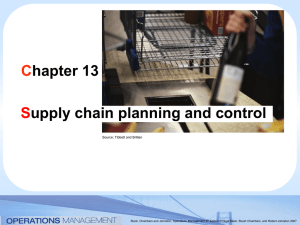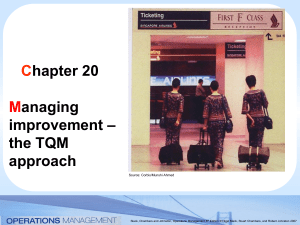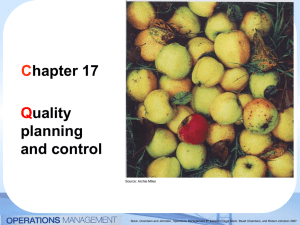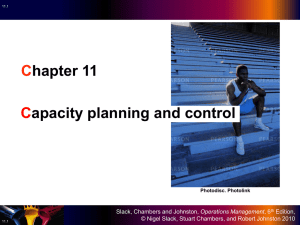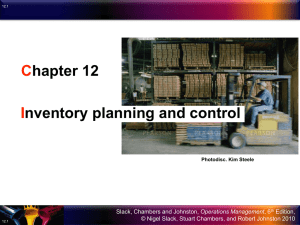Chapter 11 Powerpoint slides
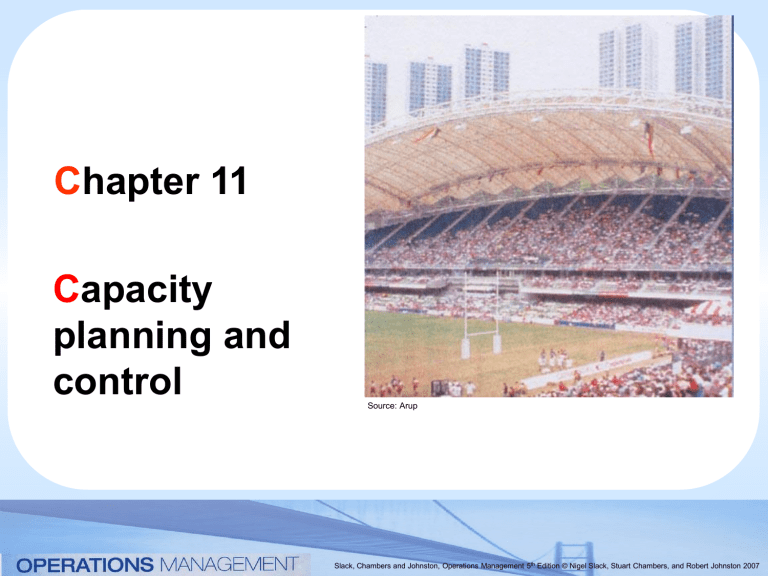
C
hapter 11
C
apacity planning and control
Source: Arup
Slack, Chambers and Johnston, Operations Management 5 th Edition © Nigel Slack, Stuart Chambers, and Robert Johnston 2007
Objective
To provide an ‘appropriate’ amount of capacity at any point in time
The ‘appropriateness’ of capacity planning in any part of the operation can be judged by its effect on …
Costs
Revenue
Working capital
Service level
Source: British Airways London Eye
Slack, Chambers and Johnston, Operations Management 5 th Edition © Nigel Slack, Stuart Chambers, and Robert Johnston 2007
Capacity Management
0 6 12 18
Months
Planning Horizon
24
Slack, Chambers and Johnston, Operations Management 5 th Edition © Nigel Slack, Stuart Chambers, and Robert Johnston 2007
Facility Decision
How Much capacity is needed?
When is the capacity needed?
Where should the capacity be located?
Slack, Chambers and Johnston, Operations Management 5 th Edition © Nigel Slack, Stuart Chambers, and Robert Johnston 2007
Objectives of capacity planning and control
Measure aggregate capacity and demand
Identify the alternative capacity plans
Choose the most appropriate capacity plan
Forecast demand
Estimate of current capacity
Time
Slack, Chambers and Johnston, Operations Management 5 th Edition © Nigel Slack, Stuart Chambers, and Robert Johnston 2007
The nature of aggregate capacity
Aggregate capacity of a hotel:
– rooms per night
– ignores the numbers of guests in each room
Aggregate capacity of an aluminium producer:
– tonnes per month
– ignores types of alloy, gauge and batch variations
Slack, Chambers and Johnston, Operations Management 5 th Edition © Nigel Slack, Stuart Chambers, and Robert Johnston 2007
Causes of seasonality
Construction materials
Beverages (beer, cola)
Foods (ice-cream, Christmas cake)
Clothing (swimwear, shoes)
Gardening items (seeds, fertilizer)
Fireworks
Travel services
Holidays
Tax processing
Doctors (influenza epidemic)
Sports services
Education services
Source: Alamy/Medical-on-line
Slack, Chambers and Johnston, Operations Management 5 th Edition © Nigel Slack, Stuart Chambers, and Robert Johnston 2007
Demand fluctuations in four operations
Slack, Chambers and Johnston, Operations Management 5 th Edition © Nigel Slack, Stuart Chambers, and Robert Johnston 2007
Ways of reconciling capacity and demand
Demand
Capacity
Demand
Capacity
Demand
Capacity
Slack, Chambers and Johnston, Operations Management 5 th Edition © Nigel Slack, Stuart Chambers, and Robert Johnston 2007
Ways of reconciling capacity and demand
How do you cope with fluctuations in demand?
Absorb demand
Level capacity
Adjust output to match demand
Chase demand
Change demand
Demand management
Slack, Chambers and Johnston, Operations Management 5 th Edition © Nigel Slack, Stuart Chambers, and Robert Johnston 2007
Absorb demand
Have excess capacity
Make to stock
Part finished
Finished goods, or
Customer inventory
Keep output level
Source: Madam Tussaud’s
Make customer wait
Queues
Backlogs
Slack, Chambers and Johnston, Operations Management 5 th Edition © Nigel Slack, Stuart Chambers, and Robert Johnston 2007
Adjust output to match demand
Hire
Temporary labour
Overtime
Subcontract
Fire
Lay-off
Short time
Source: Corbis/Photocuisine
Third-party work
Slack, Chambers and Johnston, Operations Management 5 th Edition © Nigel Slack, Stuart Chambers, and Robert Johnston 2007
Change demand
Change pattern of demand
Develop alternative products and/or services
Source: Empics
Slack, Chambers and Johnston, Operations Management 5 th Edition © Nigel Slack, Stuart Chambers, and Robert Johnston 2007
Moving a peak in demand can make capacity planning easier
Slack, Chambers and Johnston, Operations Management 5 th Edition © Nigel Slack, Stuart Chambers, and Robert Johnston 2007
